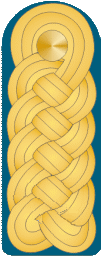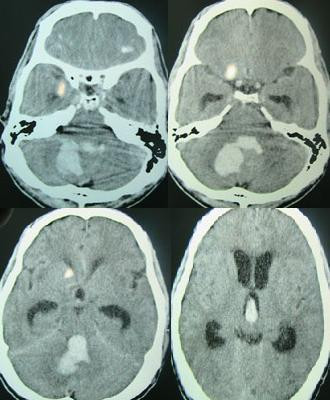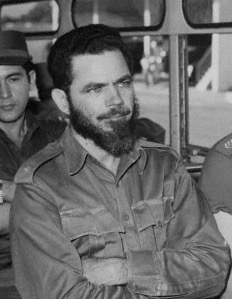|
Miguel Ydígoras Fuentes
General José Miguel Ramón Ydígoras Fuentes (17 October 1895 – 27 October 1982) was the conservative President of Guatemala from 1958 to March 1963. He was also the main challenger to Jacobo Árbenz during the 1950 presidential election. He had previously served as the governor of the province of San Marcos. Early life and military career Ydígoras Fuentes was born on a coffee plantation, in Pueblo Nuevo in the Guatemalan department of Retalhuleu, on 17 October 1895. He retained a great fondness for coffee as an adult, claiming to drink 10 cups of it in a day, and describing it as a "patriotic vice", referring to Guatemala's high coffee production. He enrolled in Guatemala's military academy, and graduated at the top of his class. He was commissioned in the Guatemalan infantry in 1915. He was posted to the Guatemalan embassy in Washington, D.C., in 1918, and to the Paris embassy in 1919. In the same year he represented Guatemala at the Paris Peace Conference. He subsequent ... [...More Info...] [...Related Items...] OR: [Wikipedia] [Google] [Baidu] |
1958 Guatemalan General Election
General elections were held in Guatemala on 19 January 1958 after the 1957 elections were nullified. After no candidate received 50% or more of the national vote, Miguel Ydígoras Fuentes was elected President by Congress on 12 February, whilst an alliance of the National Democratic Reconciliation Party, Nationalist Democratic Party, the Nationalist Liberal Party The Nationalist Liberal Party ( es, Partido Liberal Nacionalista, PLN) was a political party in Nicaragua. When Anastasio Somoza García took power in 1936, the party aligned itself with the United States and other caudillos in Latin America, li ..., the Democratic National Association and the National Anti-Communist Front won 40 of the 66 seats in Congress. Results President Congress Bibliography *Villagrán Kramer, Francisco. Biografía política de Guatemala: años de guerra y años de paz. FLACSO-Guatemala, 2004. *Political handbook of the world 1958. New York, 1959. *Elections in the Americas A Data Ha ... [...More Info...] [...Related Items...] OR: [Wikipedia] [Google] [Baidu] |
General Of Division
Divisional general is a general officer rank who commands an army division. The rank originates from the French (Revolutionary) System, and is used by a number of countries. The rank is above a brigade general, and normally below an army corps general. The rank is mostly used in countries where it is used as a modern alternative to a previous older rank of major-general or lieutenant-general. Specific countries Brazil The Brazilian rank ''general-de-divisão'' translates literally as "general of division", and is used by the army. This rank is equivalent to lieutenant-general. The air force equivalent is ''major-brigadeiro''(literally "major-brigadier"). The navy equivalent is ''vice-almirante'' (literally, vice-admiral) Chile The Chilean rank ''general de división'' translates literally as "general of division", and is used by the army. This rank is equivalent to lieutenant-general. The air force equivalent is ''general de aviación'' (literally "aviation general"). Th ... [...More Info...] [...Related Items...] OR: [Wikipedia] [Google] [Baidu] |
Guatemalan Revolution
The period in the history of Guatemala between the coups against Jorge Ubico in 1944 and Jacobo Árbenz in 1954 is known locally as the Revolution ( es, La Revolución). It has also been called the Ten Years of Spring, highlighting the peak years of representative democracy in Guatemala from 1930 until the end of the civil war in 1996. It saw the implementation of social, political, and especially agrarian reforms that were influential across Latin America. From the late 19th century until 1944, Guatemala was governed by a series of authoritarian rulers who sought to strengthen the economy by supporting the export of coffee. Between 1898 and 1920, Manuel Estrada Cabrera granted significant concessions to the United Fruit Company, an American corporation that traded in tropical fruit, and dispossessed many indigenous people of their communal lands. Under Jorge Ubico, who ruled as a dictator between 1931 and 1944, this process was intensified, with the institution of harsh labor ... [...More Info...] [...Related Items...] OR: [Wikipedia] [Google] [Baidu] |
Cerebral Hemorrhage
Intracerebral hemorrhage (ICH), also known as cerebral bleed, intraparenchymal bleed, and hemorrhagic stroke, or haemorrhagic stroke, is a sudden bleeding into the tissues of the brain, into its ventricles, or into both. It is one kind of bleeding within the skull and one kind of stroke. Symptoms can include headache, one-sided weakness, vomiting, seizures, decreased level of consciousness, and neck stiffness. Often, symptoms get worse over time. Fever is also common. Causes include brain trauma, aneurysms, arteriovenous malformations, and brain tumors. The biggest risk factors for spontaneous bleeding are high blood pressure and amyloidosis. Other risk factors include alcoholism, low cholesterol, blood thinners, and cocaine use. Diagnosis is typically by CT scan. Other conditions that may present similarly include ischemic stroke. Treatment should typically be carried out in an intensive care unit. Guidelines recommend decreasing the blood pressure to a systolic of ... [...More Info...] [...Related Items...] OR: [Wikipedia] [Google] [Baidu] |
Guatemalan Air Force
The Guatemalan Air Force ( es, Fuerza Aérea Guatemalteca or ''FAG'') is a small air force composed mostly of U.S.-made aircraft throughout its history. The FAG is a subordinate to the Guatemalan Military and its commanding officer reports to the Defence Minister. Mission and vision The mission of the Guatemalan Air Force is to "plan and conduct aerial operations to maintain and guarantee the sovereignty of the national air space, through aerial combat, supporting ground units, with the purpose of dissuading, neutralizing or destroying any threat against national obrectives, as well as cooperating with the other State institutions to accomplish national efforts." [...More Info...] [...Related Items...] OR: [Wikipedia] [Google] [Baidu] |
Bay Of Pigs Invasion
The Bay of Pigs Invasion (, sometimes called ''Invasión de Playa Girón'' or ''Batalla de Playa Girón'' after the Playa Girón) was a failed military landing operation on the southwestern coast of Cuba in 1961 by Cuban exiles, covertly financed and directed by the United States. It was aimed at overthrowing Fidel Castro's communist government. The operation took place at the height of the Cold War, and its failure influenced relations between Cuba, the United States, and the Soviet Union. In December 1958, American ally General Fulgencio Batista was deposed by Castro's 26th of July Movement during the Cuban Revolution. Castro nationalized American businesses—including banks, oil refineries, and sugar and coffee plantations—then severed Cuba's formerly close relations with the United States and reached out to its Cold War rival, the Soviet Union. The Central Intelligence Agency (CIA) began planning the overthrow of Castro, which U.S. President Dwight D. Eisenhower ap ... [...More Info...] [...Related Items...] OR: [Wikipedia] [Google] [Baidu] |
Revolutionary Movement 13th November
Revolutionary Movement 13th November (in Spanish: ''Movimiento Revolucionario 13 Noviembre'') was a leftist movement in Guatemala. MR-13 was founded in 1960 by a group of dissident officers. It grew partly out of the popular protests against the government of President Miguel Ydígoras Fuentes following his election in 1958. It was led by Luis Augusto Turcios Lima, Marco Antonio Yon Sosa and Luis Trejo Esquivel. Alejandro de León, co-founder of the group, was captured and shot by the judicial police in 1961. In 1963, MR-13 joined the Rebel Armed Forces (FAR). MR-13 nominally continued to exist until 1973, after it was severely hampered in the 1966-67 counterinsurgency by the Guatemalan government. Origins On 13 November 1960, a group of 120 young military officers joined by approximately 3000 enlisted soldiers seized the Zacapa military base and most of the Eastern Military Zone of the country and demanded the resignation of President Ydígoras. The rebels' discontent was f ... [...More Info...] [...Related Items...] OR: [Wikipedia] [Google] [Baidu] |
1957 Guatemalan General Election
General elections were held in Guatemala on 20 October 1957. Dieter Nohlen (2005) ''Elections in the Americas: A data handbook, Volume I'', p323 Miguel Ortiz Passarelli won the presidential election. However, the elections were nullified on 23 October 1957 following protests against electoral fraud. Results President References Bibliography *Villagrán Kramer, Francisco. Biografía política de Guatemala: años de guerra y años de paz. FLACSO-Guatemala, 2004. *Political handbook of the world 1957. New York, 1958. {{Guatemalan elections Elections in Guatemala Guatemala 1957 in Guatemala Presidential elections in Guatemala Annulled elections Election and referendum articles with incomplete results ... [...More Info...] [...Related Items...] OR: [Wikipedia] [Google] [Baidu] |
1954 Guatemalan Coup D'etat
Events January * January 1 – The Soviet Union ceases to demand war reparations from West Germany. * January 3 – The Italian broadcaster RAI officially begins transmitting. * January 7 – Georgetown-IBM experiment: The first public demonstration of a machine translation system is held in New York, at the head office of IBM. * January 10 – BOAC Flight 781, a de Havilland Comet jet plane, disintegrates in mid-air due to metal fatigue, and crashes in the Mediterranean near Elba; all 35 people on board are killed. * January 12 – Avalanches in Austria kill more than 200. * January 15 – Mau Mau leader Waruhiu Itote is captured in Kenya. * January 17 – In Yugoslavia, Milovan Đilas, one of the leading members of the League of Communists of Yugoslavia, is relieved of his duties. * January 20 – The US-based National Negro Network is established, with 46 member radio stations. * January 21 – The first nuclear-powered subm ... [...More Info...] [...Related Items...] OR: [Wikipedia] [Google] [Baidu] |






